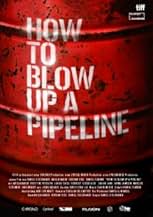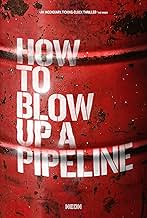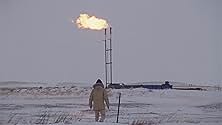CALIFICACIÓN DE IMDb
6.9/10
12 k
TU CALIFICACIÓN
Un grupo de activistas ecologistas urde un audaz plan para interrumpir un oleoducto.Un grupo de activistas ecologistas urde un audaz plan para interrumpir un oleoducto.Un grupo de activistas ecologistas urde un audaz plan para interrumpir un oleoducto.
- Dirección
- Guionistas
- Elenco
- Premios
- 5 premios ganados y 16 nominaciones en total
Opiniones destacadas
Recently, when a bunch of "Just Stop Oil" activists disturbed a World Snooker Championship game and, as per Gen-Z-climate-activist tradition, threw food all over the tables and sat themselves down in their anti-oil garments, a Twitter user quipped: "These types of climate protests are so detrimental to raising actual awareness and widespread support that if it ever came out that these people were paid for by gas and coal-owning billionaires I'd probably believe it".
Now, I don't know if the companies behind the well-made but questionable How to Blow Up a Pipeline have any such dubious ties (neither the production companies nor the distributor, Neon, have any deals with Big Oil that I could find). But man, what a time to do a psyop to make the enemy look deranged when said enemy will agree with the assessment and be proud of it!
Here is a movie loosely based on a book -- whose name-similarity to some kinda Dark Web instruction manual isn't accidental -- that speaks straight-out about how violence is a necessity for "climate justice"; essentially how destruction is correct so long as it's (purportedly) in the name of the right cause. I guess I shouldn't be too shocked. It was racism in 2020, it's climate change now; I just thought it was gonna be less mask-off terror apologia and more trying to rationalize throwing soup at art to make fossil fuels go away.
Then again, the book predates all those incidents and this manner of disruption was fairly commonplace in Sweden, the author's homeland, before the big vandalism stories of recent UK and US news. Perhaps the real surprise is that it came out after the Nord Stream incident -- an as-yet-unresolved case (of POSSIBLE eco-terrorism) that damaged decidedly more than "replaceable property" (what many radicals will tell you is the only real victim, even on a bad day). Not that this ever really stopped at "property", especially among the new wave of post-Thunberg soup Zoomers.
I sometimes ask: If, for example, a patient dies inside an ambulance as a result of road-blocking climate protestors -- as has literally happened in, you guessed it, Sweden a few months ago -- is that person deemed a necessary sacrifice for the utopia? After all, what's one death vs. The doomsday you've been told you're preventing? Do you redirect the trolley to kill one human when there are 8 billion hypothetical humans on the other track?
I accuse people of pussyfooting around this query, but I realize they've been answering me through actions for some time. When activists were convicted for the incident in Sweden, there were additional manifestations -- not in the name of the person that died, but the ones that got arrested.
Will a film like this exacerbate things? Hopefully not. It's being praised by the Usual Journalists for portraying the "terrorists" (sometimes in quotes, sometimes not) in a sympathetic light, but I didn't read them as outright unblemished. Someone will go "This was my Joker" but someone always does.
Now, I don't know if the companies behind the well-made but questionable How to Blow Up a Pipeline have any such dubious ties (neither the production companies nor the distributor, Neon, have any deals with Big Oil that I could find). But man, what a time to do a psyop to make the enemy look deranged when said enemy will agree with the assessment and be proud of it!
Here is a movie loosely based on a book -- whose name-similarity to some kinda Dark Web instruction manual isn't accidental -- that speaks straight-out about how violence is a necessity for "climate justice"; essentially how destruction is correct so long as it's (purportedly) in the name of the right cause. I guess I shouldn't be too shocked. It was racism in 2020, it's climate change now; I just thought it was gonna be less mask-off terror apologia and more trying to rationalize throwing soup at art to make fossil fuels go away.
Then again, the book predates all those incidents and this manner of disruption was fairly commonplace in Sweden, the author's homeland, before the big vandalism stories of recent UK and US news. Perhaps the real surprise is that it came out after the Nord Stream incident -- an as-yet-unresolved case (of POSSIBLE eco-terrorism) that damaged decidedly more than "replaceable property" (what many radicals will tell you is the only real victim, even on a bad day). Not that this ever really stopped at "property", especially among the new wave of post-Thunberg soup Zoomers.
I sometimes ask: If, for example, a patient dies inside an ambulance as a result of road-blocking climate protestors -- as has literally happened in, you guessed it, Sweden a few months ago -- is that person deemed a necessary sacrifice for the utopia? After all, what's one death vs. The doomsday you've been told you're preventing? Do you redirect the trolley to kill one human when there are 8 billion hypothetical humans on the other track?
I accuse people of pussyfooting around this query, but I realize they've been answering me through actions for some time. When activists were convicted for the incident in Sweden, there were additional manifestations -- not in the name of the person that died, but the ones that got arrested.
Will a film like this exacerbate things? Hopefully not. It's being praised by the Usual Journalists for portraying the "terrorists" (sometimes in quotes, sometimes not) in a sympathetic light, but I didn't read them as outright unblemished. Someone will go "This was my Joker" but someone always does.
How to Blow Up a Pipeline is a punchy film with a pertinent message.
It follows a group of environmental activists who, you've guessed it, hatch a plot to blow up a pipeline. The plot tracks them as they begin to enact their plan, and also delves into each of their back stories to reveal why they have arrived at this drastic course of action.
It makes for a compelling watch I must say. Each of the characters are interesting and distinct, and delving into their backstories is engaging. The performances are all very solid.
Visually the film is appealing but sparse, with few bells and whistles. It looks rugged and rough which works well.
In terms of pacing it does leave a little to be desired. There are a few troughs, but actually I found the whole thing more thrilling than I was expecting.
The result is a thoroughly entertaining and engaging film with a strong and timely message at its core.
It follows a group of environmental activists who, you've guessed it, hatch a plot to blow up a pipeline. The plot tracks them as they begin to enact their plan, and also delves into each of their back stories to reveal why they have arrived at this drastic course of action.
It makes for a compelling watch I must say. Each of the characters are interesting and distinct, and delving into their backstories is engaging. The performances are all very solid.
Visually the film is appealing but sparse, with few bells and whistles. It looks rugged and rough which works well.
In terms of pacing it does leave a little to be desired. There are a few troughs, but actually I found the whole thing more thrilling than I was expecting.
The result is a thoroughly entertaining and engaging film with a strong and timely message at its core.
It's a tense movie with some good moments, interesting cinematography, and an even better score. However, it didn't live up to the high expectations.
Even I, who agree with the main message, found it to be too one-sided. Other perspectives are not heard, there are no arguments, no pros and cons (when there are - and only about the method - a conclusion is quickly reached). I like movies that make me reflect and not movies that feed me the message with a spoon, forcing me to accept that. The structure is interesting, although cutting the tension doesn't always have the desired effect (which I believe is the same as a cliffhanger on tv shows). Lastly, the characters are too linear, too victimized. We know almost nothing about what sets them apart, we are only left with their motivations - all with direct causes - to do what they want to do. Ok, but didn't make me care a lot about them.
It's an ok, flawed, somewhat interesting little thriller with an important message, but that's all it is.
Even I, who agree with the main message, found it to be too one-sided. Other perspectives are not heard, there are no arguments, no pros and cons (when there are - and only about the method - a conclusion is quickly reached). I like movies that make me reflect and not movies that feed me the message with a spoon, forcing me to accept that. The structure is interesting, although cutting the tension doesn't always have the desired effect (which I believe is the same as a cliffhanger on tv shows). Lastly, the characters are too linear, too victimized. We know almost nothing about what sets them apart, we are only left with their motivations - all with direct causes - to do what they want to do. Ok, but didn't make me care a lot about them.
It's an ok, flawed, somewhat interesting little thriller with an important message, but that's all it is.
Up until this film I had never heard of the book How to Blow Up a Pipeline nor of it's author, Andreas Malm but this Swedish writer and associate professor has been preaching the 'joys' of environmentalists taking direct action to property for awhile. Is this fictional depiction of his writing a good summary of Malm's thoughts? It would appear so.
Of course, that doesn't make the movie good. What does make it worth a watch is how the planning and execution of this act of violence (or self defense) is portrayed. The director, Daniel Goldhaber, has given us a very decent thriller. Yes, the characters are not terribly deep but if you enjoy watching smart people figure out a heist, well in this case an explosion, then this is the film for you. Also, to have a film made in America that is basically pro-terror attack 22 years after 9/11 makes for fascinating viewing. Who would have ever guessed this day would ever come?
Should this film get any push back I have no doubt you'll hear some denounce the picture by saying brute force is not the answer. The problem with that argument is that cinema has been celebrating violence against people (See any action movie, cop film or western) for years so why not one about violence against oil pipelines?
Of course, that doesn't make the movie good. What does make it worth a watch is how the planning and execution of this act of violence (or self defense) is portrayed. The director, Daniel Goldhaber, has given us a very decent thriller. Yes, the characters are not terribly deep but if you enjoy watching smart people figure out a heist, well in this case an explosion, then this is the film for you. Also, to have a film made in America that is basically pro-terror attack 22 years after 9/11 makes for fascinating viewing. Who would have ever guessed this day would ever come?
Should this film get any push back I have no doubt you'll hear some denounce the picture by saying brute force is not the answer. The problem with that argument is that cinema has been celebrating violence against people (See any action movie, cop film or western) for years so why not one about violence against oil pipelines?
When I read about "How to Blow Up a Pipeline", I just had to see this movie. It is a timely political thriller that follows a group of eco-saboteurs who target an oil pipeline. Led by Xochitl, played by Ariela Barer, the group includes a diverse mix of characters, each with their own reasons for taking drastic action against the things that are killing the planet. The movie intercuts between their operation in Texas and flashbacks that reveal each character's motivations. We follow the group's nerve-wracking operation in Texas, where they check out their target, rig up explosives, and then set about doing the deed. Despite its political leanings, the movie doesn't preach or glamorize its characters, and the actors deliver strong performances that bring the characters to life. A very enjoyable movie to watch.
¿Sabías que…?
- TriviaMalm's book (How to Blow Up a Pipeline) is a work of nonfiction that uses a history of social justice movements to argue that property destruction should be considered a valid tactic in the pursuit of environmental justice.
- ConexionesFeatures Spy x Family (2022)
- Bandas sonorasChamomile
Written, Performed, and Produced by Cameron Burt (as Winslow Leach)
Selecciones populares
Inicia sesión para calificar y agrega a la lista de videos para obtener recomendaciones personalizadas
- How long is How to Blow Up a Pipeline?Con tecnología de Alexa
Detalles
- Fecha de lanzamiento
- País de origen
- Sitio oficial
- Idioma
- También se conoce como
- How to Blow Up a Pipeline
- Locaciones de filmación
- Productoras
- Ver más créditos de la compañía en IMDbPro
Taquilla
- Total en EE. UU. y Canadá
- USD 750,010
- Fin de semana de estreno en EE. UU. y Canadá
- USD 115,453
- 9 abr 2023
- Total a nivel mundial
- USD 1,046,811
- Tiempo de ejecución1 hora 44 minutos
- Color
- Relación de aspecto
- 1.78 : 1
Contribuir a esta página
Sugiere una edición o agrega el contenido que falta

Principales brechas de datos
What is the Hindi language plot outline for How to Blow Up A Pipeline (2022)?
Responda






































